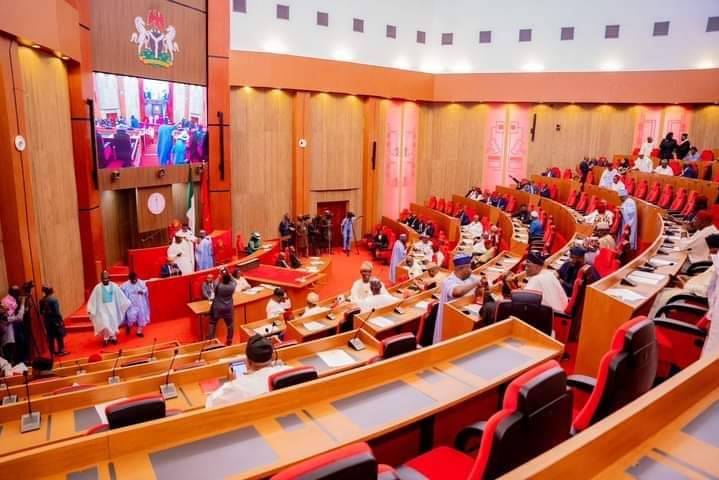Senate Moves To Amend Electricity Act To Rescue Failing Power Sector
•By Admin
ABUJA – The Nigerian Senate has taken a significant step toward reforming the country’s ailing power sector with the second reading of the Electricity Act (Amendment) Bill, 2025.
The proposed amendment, which seeks to address longstanding infrastructural, regulatory, and financial problems in the electricity industry, was sponsored by Senator Enyinnaya Abaribe (APGA, Abia South).
If passed into law, the bill would criminalise vandalism of power infrastructure, streamline the transfer of regulatory authority from the Nigerian Electricity Regulatory Commission (NERC) to state governments, and enhance coordination between federal and state agencies. The bill passed its first reading on June 25 and was extensively debated on the Senate floor on Tuesday.
Leading the debate, Abaribe did not mince words in describing the gravity of the situation. “The power sector is hanging on a cliff,” he declared, pointing to widespread operational inefficiencies, a ballooning debt crisis, and jurisdictional confusion as key threats to Nigeria’s energy stability.
The bill’s introduction comes after the Senate’s Committee on Power was mandated to conduct a comprehensive assessment of the sector’s worsening state. The investigation followed a series of motions by concerned lawmakers who noted that despite privatisation and billions spent, electricity supply has remained erratic.
The proposed bill is comprehensive in scope and aims to amend several provisions of the 2023 Electricity Act to reflect current realities and address policy gaps. Its key objectives include:
Criminalising Vandalism: The bill introduces severe penalties for individuals or groups who sabotage electricity infrastructure. Vandalism has been a major cause of power disruptions nationwide.
With electricity now on the concurrent list, the amendment seeks to legally define the transfer of regulatory authority from NERC to state governments—especially in matters involving the national grid and overlapping oversight.
It proposes a framework for improved coordination between federal and state electricity institutions to avoid regulatory conflicts and jurisdictional ambiguity.
The amendment aims to improve financial flows in the sector, address unpaid debts to generating companies (GenCos) and distribution companies (DisCos), and ensure better use of public funds.
A clear framework is proposed for implementing the Power Consumer Assistance Fund to ensure that subsidies are targeted at vulnerable groups and essential public services rather than being applied haphazardly.
The bill introduces provisions to protect workers’ rights while maintaining uninterrupted electricity services, aligning with national labour laws and international standards.
It proposes a new framework guiding the relationship between electricity companies and host communities, to promote inclusivity and reduce conflict.
The amendment also seeks to provide statutory backing to bodies like the National Electric Power Policy Council and the Forum of Electricity Regulators, which are expected to play key roles in the evolving electricity landscape.
Lawmakers across party lines voiced strong support for the bill, citing personal experiences and constituents’ complaints about the dire state of electricity nationwide.
Senator Adamu Aliero (APC, Kebbi Central) called for capital punishment for vandals of electricity infrastructure, expressing frustration that the federal government continues to shoulder financial burdens despite privatising the power sector.
“We’ve privatised electricity, yet the government is still spending billions. Vandals of public assets should be punished severely,” he said.
Senator Olamilekan Adeola (APC, Ogun West), Chairman of the Senate Committee on Appropriations, applauded the decentralisation of power generation rights but questioned the logic of continuing to allocate public funds to NBET (Nigerian Bulk Electricity Trading Company) without adequate results. He also raised concerns over reports of contractors sabotaging their own projects in order to win repeat contracts.
“If this bill blocks such corrupt practices, we will have solved over 50 percent of our power sector problems,” Adeola said. He cautioned, however, that the amendment must align with the executive’s energy reform roadmap, as it is a private member’s bill.
Senator Garba Maidoki (APC, Kebbi South) highlighted the unwillingness of power companies to comply with Senate directives and lamented rising tariffs amid poor service. “GENCOs owe the NNPC for gas supply for over five years, yet they keep increasing tariffs. Even as a senator, I struggle to pay my bills,” he remarked.
Senator Sahabi Yaú (PDP, Zamfara North) criticized the common practice where communities are made to purchase transformers, only for DisCos to take ownership and bill users for connections. He stressed the importance of continuing electricity subsidies, noting, “Power is subsidised globally. Nigeria cannot be an exception.”
Responding to concerns over public perceptions of lawmakers’ motives, Senate President Godswill Akpabio reaffirmed the Senate’s commitment to national development, not personal gain.
“People think we are here to make money. No—we are here to legislate and build a better future for our children,” Akpabio said, before referring the bill to the Senate Committee on Power for further legislative work.
The committee has six weeks to review the bill and present a report for further consideration.
Despite being Africa’s largest economy, Nigeria has consistently failed to deliver reliable electricity to its citizens. With an installed capacity of over 12,000 megawatts, the country barely manages to transmit half of that on a good day due to transmission losses, infrastructure decay, gas shortages, and policy misalignment.
The 2023 Electricity Act was widely hailed as a progressive law that liberalised electricity generation and empowered state governments. However, its implementation has revealed several grey areas, including overlapping regulatory roles, unclear subsidy mechanisms, and inadequate protection for host communities and workers.
The 2025 amendment, if passed, could plug those gaps and provide a more responsive legal framework for the future of Nigeria’s electricity supply.
As power remains central to economic growth, job creation, and public service delivery, Nigerians will be watching closely to see whether the legislative process will yield results—or merely become another well-intentioned reform stuck in implementation limbo.
•INDEPENDENTNG.

